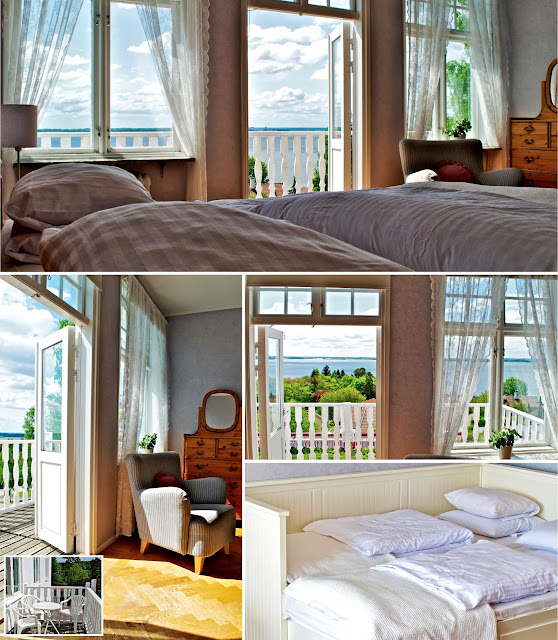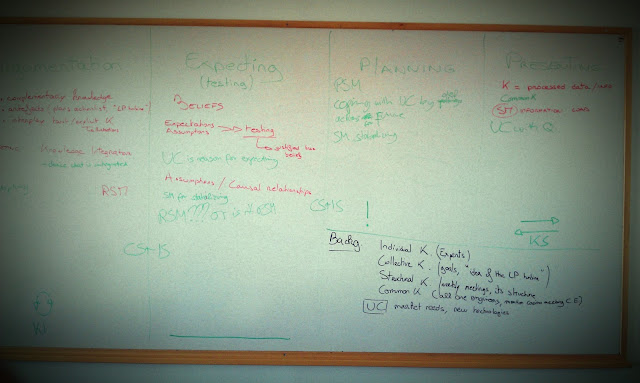At Linköping University (LiU), the
SMIO master program being followed by 95% of international students represents the diversity of the world cultures. Our differences can be interesting and we learn everyday how to build stronger relationships.
"We didn't all come over on the same ship, but we're all in the same boat." — Bernard M. Baruch.
Last Friday (
May 3rd), Shideh, Andy and Sunny gave a breakfast presentation on the hidden aspects of cross-cultural communication between Sweden and Canada
(Shideh), the U.S.
(Andy) and China
(Sunny). It took place in the Mjärdevi Science Park (nearby the campus) in front of 70 participants: mostly entrepreneurs or experienced businessmen or women engaged in international business, as well as supporting classmates interested in their multicultural experience.
 |
| Shideh Tabe, Andrew Wind and Yangzi Sunny Wangsun |
 |
Hofstede's cultural dimensions comparison
between Sweden and Canada |
Originally from Iran, Shideh kicked-off the presentation based on her 11 years of experience in the banking sector in Canada: this large country where people hate to be mistaken for Americans! She emphasized that the Canadian culture largely influences their communications in terms of tone of voice, body language, personal space, greetings and most importantly:
small talks! Taking into consideration
Hofstede's cultural dimensions, she noted that the main differences reside in the masculinity
(MAS) and uncertainty avoidance
(UAI) of Canada. However, when she arrived in Sweden, she noticed that Canadians focus more on attracting new customers, their satisfaction & loyalty and they give sugar-coat negative answers.
Shideh's key take-aways to do business in Canada were:
- Motivation is in individual success
- Incentives to stand out
- Customer is always right
- Be ready to have 'small talk' in streets, banks, stores, bus stops, etc.
 |
Hofstede's cultural dimensions comparison
between Sweden and China |
Sunny—most Chinese have an English name, she says—started her speech using Hofstede's power distance
(PDI) dimension to show that hierarchy is really important in China: employees do not publicly challenge their manager's directives, which makes it easier for the latter to implement changes. Making business in China mainly means building a relationship. Karaoke is an option, a dinner invitation seems easier but Sunny warned the audience on the
Chinese dinner etiquette:
"Prepare to get drunk and don't finish all the dishes, otherwise more food will be ordered!"
Moreover, Chinese dislike being negative: they never say no, but 'maybe' and have difficulties to give negative feedback.
 |
Hofstede's cultural dimensions comparison
between Sweden and the U.S. |
Sweden likes the American culture. Yet, Andy started his part on communication in the U.S. by reminding that most of Americans never traveled out of their country. Thus, having a business relationship with a Swede is seen as exotic and highly valued in their culture. Showing Hofstede's individual
(IDV) dimension of the U.S. and
Jack Welch's quote
"Control your own destiny or someone else will."; Andy shows the dynamic and competitive environment of the American business culture and the motivation of the American workers. As a result, managers focus on the short-term implications of decisions and that's why Andy recommends the audience to focus on 'quick wins' when making business in the U.S.
Moreover, Americans love debates and they'll show it by talking clearly about their issues. Yet, at work, the manager decides: as Steve Jobs said
"My job is to say when something sucks rather than sugarcoat it." Andy added that small talks are also common for Americans, it is part of the language protocol. You should answer politely but it doesn't mean that a long-term relationship is being set-up! Eventually, with Hollywood or Broadway, Americans are historically embedded in
storytelling. Using metaphors to illustrate a concept and making a scenario to connect them all is the key to understanding in the U.S.
Andy's key take-aways to do business in the U.S. were:
- Americans value straight talking and 'getting to the point'
- Sell your pluses
- Humor or ‘small talk’ can be an important relationship builder
- Create storylines.
The audience enjoyed a buffet-breakfast while Andy wisely concluded a successful presentation, showing the SMIO programme engagement towards the business world and its main actors:
"As our world flattens and we come closer together we find new connections and also expose new individualities. You are the mapmakers of the 21st century, your intercultural business partnerships will expose new ideas and ways of communicating yet to be uncovered that will bring us all forward in the future to come." — Andy.



.jpg)

















